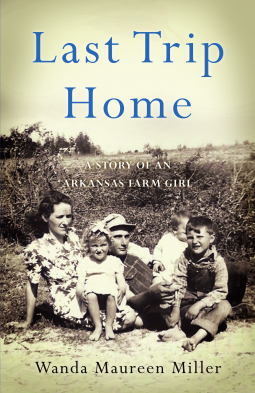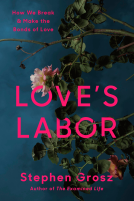
Last Trip Home
A Story of an Arkansas Farm Girl
by Wanda Maureen Miller
This title was previously available on NetGalley and is now archived.
Send NetGalley books directly to your Kindle or Kindle app
1
To read on a Kindle or Kindle app, please add kindle@netgalley.com as an approved email address to receive files in your Amazon account. Click here for step-by-step instructions.
2
Also find your Kindle email address within your Amazon account, and enter it here.
Pub Date May 15 2018 | Archive Date May 08 2018
Talking about this book? Use #LastTripHome #NetGalley. More hashtag tips!
Description
Advance Praise
“With a writer’s voice that is sassy and vibrant, Wanda Maureen Miller’s gripping narrative took me by the heart and the scruff of my neck into regions I would never otherwise have explored.”
—Nancy Bacal, creator and leader of The Writer’s Way workshops, editor of Leonard Cohen’s anthology, Stranger Music, and writer/producer of RAGA, starring Ravi Shankar and George Harrison
“An outrageous story of love and redemption set in the not-so-gracious South, from an exciting and completely original new voice. Last Trip Home is for people who like their sanity skewed.”
—Terri Cheney, author of the New York Times bestseller Manic and blogger for Psychology Today
“A candid, piercing, and often funny reveal of how kith and kin in an Arkansas sharecropper shack can both maim and love. Miller is a literary sharpshooter whose memoir of her impoverished family eking by on squirrel provides riveting redneck rubbernecking.”
—Gali Kronenberg, former reporter for the Los Angeles Times and San Diego Union Tribune
“In post–World War II Arkansas, Grace Marie escapes her insular past with its strict behavior codes for females. Scrubbing away drawl and shame, she is now an emancipated woman in California. Yet she feels compelled to return home repeatedly when her family desperately needs help. The tone is often dark, yet there is redemption in her rise above poverty, shameful secrets, and a violent, out-of-bounds father. The story takes the clichéd ‘you can’t go home again’ theme and turns it into a more complicated look at community bonds, family love, and sense of duty.”
—Sharon Steeber, professor of English at Santa Monica College, author of The Jews, and coauthor of the Reading Faster and Understanding More series
“As a black American, I approached Last Trip Home with trepidation but couldn’t stop reading. I remember my parents’ stories about violence from the Texas Ku Klux Klan. The characters are gut wrenchingly real, presented with both brutal honesty and humor. I got an insight into a way of thinking and living diametrically opposed to all that I’ve known and respected; yet I felt pity and empathy. I cheered when Grace Marie burned her husband’s KKK sheet. This book shows how the world of reading can open up a young mind. I profoundly appreciate the insight and hope represented.”
—Judy Francis, former diplomat for the US Department of State
Available Editions
| EDITION | Other Format |
| ISBN | 9781631523397 |
| PRICE | $17.95 (USD) |
| PAGES | 256 |
Links
Average rating from 8 members
Featured Reviews
 Kathleen D, Reviewer
Kathleen D, Reviewer
'I buried Daddy on Christmas Eve in Arkansas. Even in death, he was inconsiderate.'
Grace Marie grew up in poverty, where men dominated through brutal abuse (verbal, physical, and sexual to name a few). Men wearing women down so much they aged before their years, evident in the lined falling faces of her mother, grandmother, aunts. Grace’s father in particular crossed the line with his groping and ‘teasing’ as she was coming of age. In order to escape the curse of the women in her family, such a long-suffering line full of nervousness and ‘female shame’, she marries young. As with all the things we grab when we’re drowning, little did she imagine it would bring her right back to the place she hoped to escape and suffocate her. Racism has its grip in her town, too young to understand the slurs and hatred it’s no surprise her first marriage and attempt to escape is with a member of the Klan. But that is all to come later.
Living in small homes with absolutely no privacy, it was normal for her to listen to the grunts and groans of her parents nightly intimacies. Bathing with a complete lack of privacy isn’t so alarming when you’re little and haven’t developed but when you are becoming a young woman and your father is turning lecherous, it is downright shameful. Being poor isn’t a thing you’re much aware of when everyone else around you is poor too. But there are things, soul deep wrongs, that one can feel are unnatural. Why doesn’t her mother protect her? Things were different before Daddy came home from the war, but with him came all the darkness that would surround her life and settle in her spine long after she fought for her education and found a way to rise above her hardscrabble beginnings.
Her father had secrets, as it seems her entire extended family did. Murder, mental illness, sexual abuse, mysterious children, there is more she didn’t know about her parents than she knew. The sexualized behavior between her parents seemed more a way to demean her mother in front of the children. Women did not stand up to their men, in fact, her dad is such a threatening presence that no one did, not even strapping local men and extended family. Fathers should protect their children, clothe and feed them, funny that the dark woods surrounding their home, which would terrify even grown adults, is less a fright than the ever looming threat of her dad. “When he was in the house, he dominated every room.” You can’t really comprehend the gut sick terror of living with an abuser, the way children cave into themselves for fear of being hit, or touched. Walking on eggshells, afraid to disturb the beast and even at your perfect behavior , you know the peace and quiet cannot be trusted and won’t last long.
Naturally, as Grace and her siblings come of age they are humiliated by the antics of their father, the hardest part for them about growing up is the awareness of their family dysfunction. His lecherous teasing even chases Grace’s friends away. As the violence escalates, she loses her brother Joe Buck in the mayhem. For many years, he is unable to return to the land that belongs to them, missing even their mother’s funeral. Her younger sister Violet was born with difficulties, ridiculed by her siblings and later at school, Grace is both sympathetic and ashamed of her. It certainly wasn’t a time kind to children with learning difficulties or physical handicaps, much worse within an abusive family structure. It’s hard to imagine she ever stood a chance to become anything more than she did. There is an incident when Violet is trying to spell Cat, and it gutted me, it is such a disturbing, disgusting reaction, so much rage over her inability to ‘learn.’ Sorry to say this happened back in the day often, and I know there are children today who suffer such violence. Not every child with a disability is born to loving parents. If it’s hard to read, imagine Violet’s suffering because no amount of shrinking into herself can make the bad man go away, she couldn’t close a book like we can. Imagine what it does to the siblings witnessing it. It got me to thinking about the damage dysfunctional families do, whether you are the object of abuse or not, witnessing it is horrifying, there is guilt in that you can’t do anything to stop it. Resentment that her difference causes such disruption in the household, inspires rage in their father and absolute horror and shame that Grace felt resentment for her sister, who she also loved.
It seems nothing short of a miracle that Grace was able to gather enough spirit and strength to make a good life for herself, and a successful one as a college professor. The Last Trip Home never really happens, because you carry your home inside of you forever. Old wounds heal, scar over but they are still tender. No one can give her back the years of lost innocence, no one can rewind time and give the siblings happy surroundings so their bonds can strengthen, so that Violet can get all the education and support she too needed. That is the brutality of family dysfunction! It is lives beneath your skin, in your bones, at the base of your spine. A person can heal, can build a beautiful future, but the scattered bones of your haunted past is always present.
I was thinking about how young girls feel as they are going through puberty, all those changes to our bodies that we can’t hide. How it’s awful enough, the way men’s gazes change, the sudden sexualization of your body when your mind has yet to catch up, and the lines that blur between what is appropriate and what isn’t. There are humiliations you can’t quite accuse people of committing, inappropriate jokes or touches (that too long hug, that slide of a hand across your chest, oops) all the stuff everyone laughs off. The lecherous perusal from strangers far too old to be gazing on a girls young body like that, fear of walking past a group of rowdy men, this is the world for girls. It’s horrific enough coping with the threat of strangers, I cannot fathom it coming from your own father. I wanted so badly to save Grace, but she could only save herself.
There are racial slurs in the memoir, of course there are, and as uncomfortable as it is to read, imagine not understanding the scope of hatred from the exposed child’s perspective. Children learn to mimic their parents, learn right from wrong, how to speak, how to navigate the world. The child didn’t give birth to racial slurs, that is taught at home. Grace doesn’t feel the same as her family, nor her first husband, with their vile racism. Living with that hatred is abuse, it is forced upon you day after day. There is a violence in bigotry, prejudice that she cannot hide from. It strips a child of dignity, to be force-fed hate, it is against the tender nature so many of us are born with. We feel it when something isn’t right, and Grace certainly doesn’t understand why her father demeans those with different colored skin, knowing what she observes is in direct opposition with the constant accusations her father makes against the black community. Mark my words, children who grow up in racist households don’t always fall into line with prejudice. Thank God for that. It’s abuse of a child as much as everything else that befalls Grace and her siblings.
Her mother, through Grace we learn why she didn’t do more. It makes sense, there ia a circle of abuse. We don’t accidentally choose damaged people, history loves to repeat itself, and patterns of abuse continue. How do you recognize normal when you see it if you’ve never had it? It’s hard to accept tenderness if you’re offered it, when all you’ve known is hard living and meanness. It’s not a mystery to me why people self-sabotage, even in trying to escape brutality. Better the devil you know. Kindness is as painful as abuse, because how do you trust it? It was never meant for you, you’re nothing.
I love that Grace isn’t feeling tender and forgiving at the start of the memoir. People have a tendency to think kindly of those who have passed on, as if in death they are suddenly saintly. You think, ‘Wow, that’s harsh,” until you read the history of her upbringing, boy how fast your thirst for forgiveness disappears. Hard to stomach, but an engaging read.
Publication Date: May 15, 2018
She Writes Press
 Susie D, Educator
Susie D, Educator
Really enjoyed reading this book and learning about another persons experiences in life. It made me appreciate and have understanding of another persons life.
 Deb N, Reviewer
Deb N, Reviewer
I received this book through NetGalley and its publisher, She Writes Press, and sure am glad I did. From the first page, it grabs your attention.
It is a true story about Grace-Mayree (the author): her childhood, education, relationships and life. It shares her relationship with her father and the family dynamics living in Arkansas. Throughout the story, my heart ached for Grace-Mayree and her siblings. Without divulging too much, I can say it was well worth the time to read it. The author has a great ability to share her life clearlyand how she overcame challenges.
It’s a book you don’t want to put down. I thoroughly enjoyed it and recommend it.
Readers who liked this book also liked:
We Are Bookish
General Fiction (Adult), Literary Fiction, Women's Fiction


















